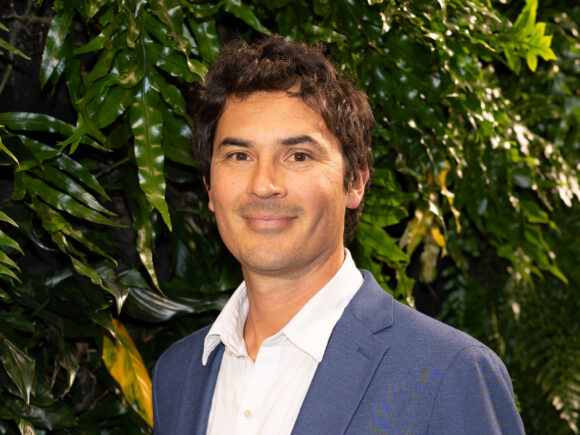
L-R: Plant Biology graduate student Mark Labarge and Ryan Earp, and agricultural agent, RCE of Monmouth County, William Errickson won accolades at 2024 ASA, CSSA and SSSA International Annual Meeting.
From November 10-13, leading scientists, researchers, educators, policymakers, students, exhibitors and government institutions gathered at the 2024 International Annual Meeting of the American Society of Agronomy (ASA), the Crop Science Society of America (CSSA), and the Soil Science Society of America (SSSA) to discuss cutting-edge developments in agronomy, crops and soil science. The theme for this year’s meeting was “AI Innovations for a Changing Climate.”
The annual meeting, which was held in San Antonio, TX, offered scientific sessions, workshops, poster sessions, an exhibit Hall, and student-focused programming that ensured numerous opportunities for students pursuing studies in these fields.

Plant Biology graduate student Mark Labarge.
Plant Biology graduate student Mark Labarge won second place in the graduate student oral presentation competition for Turfgrass Breeding, Genomics, Physiology, and Molecular Biology for “Evaluation of Improved Cold Hardy Bermudagrass and Zoysiagrass for Use in New Jersey,” with Christopher Tkach, Eric MacPherson, Matthew Elmore, James Murphy, and Stacy Bonos.
According to Lebarge, “turfgrass managers in New Jersey face numerous challenges, such as heat and drought, that are becoming more intense with the growing effects of climate change. Plant breeders have made significant improvements in bermudagrass and zoysiagrass that make them a promising option for utilization in the state. This presentation and the associated research aim to provide information on the performance, benefits, and shortcomings of these species for turfgrass managers in New Jersey.”

Plant Biology graduate student Ryan Earp.
Graduate student Ryan Earp won second place in the graduate student poster presentation under the Turfgrass Breeding, Genomics, Physiology, and Molecular Biology category for “Comparison of Genotype Calling Methods for Kentucky Bluegrass,” with Juan Gonzalez, Christine Kubik, Jennifer Vaicinus, Josh Honig, and Stacy Bonos.
“I presented on my preliminary thesis work evaluating different software to conduct genetic evaluation of Kentucky Bluegrass, a common turfgrass used in the northern United States. This grass has a complex genetic makeup which makes leveraging genetic information difficult,” said Earp. “My work aims to help bridge the gap between genetic information and sustainable turf traits to assist in advancing the breeding goals of the Rutgers turfgrass breeding program.”

Plant Biology faculty and RCE county agent William Errickson.
William Errickson, Plant Biology faculty and agricultural agent, Rutgers Cooperative Extension of Monmouth County, won the Outstanding Paper in Turfgrass Science Award as the principal author of the article: Errickson, W., Huang, B., Zhang, N. Promotive Effects of Endophytic Rhizobacteria on Tiller and Root Growth in Creeping Bentgrass During Drought Stress and Post-stress Recovery Involving Regulation of Hormone and Sugar Metabolism. Crop Science, 63(4), 2583-2593.
According to Errickson, “the article discusses innovative research from the Rutgers Center for Turfgrass Science, in which a native strain of beneficial root bacteria from the New Jersey Pine Barrens was used to improve drought stress tolerance in turfgrass. Turf plants that were inoculated with this bacterium were able to maintain higher quality and grow bigger roots with less water. This research can help to conserve important freshwater resources while still maintaining healthy turfgrass in New Jersey.”

